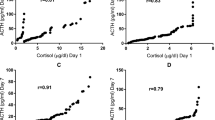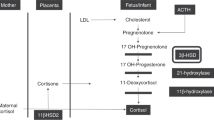Abstract
Objective:
To determine cortisol and adrenocorticotropic hormone (ACTH) responses to critical illness in term and late preterm newborns and examine the relationship of these values to measures of clinical illness, including markers of cardiovascular dysfunction.
Study Design:
In this prospective observational study, we measured ACTH, baseline cortisol and ACTH-stimulated cortisol concentrations in mechanically ventilated infants ⩾34 weeks gestational age and <5 postnatal days. ACTH-stimulated cortisol concentrations were also measured in a comparison group of non-critically ill, non-mechanically ventilated infants. The relationship of these values to measures of severity of illness including SNAP (score for neonatal acute physiology) scores, blood pressure and vasopressor initiation was examined.
Result:
Concentrations are presented as median (25th to 75th percentile). Baseline cortisol values in critically ill infants (n=35) were 4.6 μg per 100 ml (3.0 to 16.2); 26 (74%) of these were <15 μg per 100 ml. ACTH-stimulated cortisol values were not significantly different from the comparison group (41 μg per 100 ml (30.3 to 51.8) vs 34.2 μg per 100 ml (25.2 to 43.3)). ACTH concentrations in ill infants (n=10) were 12 pgml−1 (5.5 to 19.2). None of baseline cortisol, stimulated cortisol and ACTH increased significantly with increasing severity of illness. Of the ill infants, 71% received vasopressor therapy for hypotension. Cortisol concentrations in these infants were similar to those infants who did not receive vasopressor therapy.
Conclusion:
The majority of these critically ill newborns had very low cortisol and ACTH values without the expected increase in response to critical illness; however, their response to exogenous ACTH was normal. These results demonstrate that the inadequate response to critical illness in these newborns does not result from adrenal dysfunction. We therefore hypothesize that this is a secondary insufficiency arising from inadequate stimulation of the adrenal gland.
This is a preview of subscription content, access via your institution
Access options
Subscribe to this journal
Receive 12 print issues and online access
$259.00 per year
only $21.58 per issue
Buy this article
- Purchase on Springer Link
- Instant access to full article PDF
Prices may be subject to local taxes which are calculated during checkout


Similar content being viewed by others
References
Finlay WE, McKee JL . Serum cortisol levels in severely stressed patients. Lancet 1982; 1: 1414–1415.
Joosten KF, de Kleijn ED, Westerterp M, de Hoog M, Eijck FC, Hop WCJ et al. Endocrine and metabolic responses in children with meningoccocal sepsis: striking differences between survivors and nonsurvivors. J Clin Endocrinol Metab 2000; 85: 3746–3753.
Langer M, Modi BP, Agus M . Adrenal insufficiency in the critically ill neonate and child. Curr Opin Pediatr 2006; 18: 448–453.
Rothwell PM, Udwadia ZF, Lawler PG . Cortisol response to corticotropin and survival in septic shock. Lancet 1991; 337: 582–583.
Soni A, Pepper GM, Wyrwinski PM, Ramirez NE, Simon R, Pina T et al. Adrenal insufficiency occurring during septic shock: incidence, outcome, and relationship to peripheral cytokine levels. Am J Med 1995; 98: 266–271.
Sprung CL, Annane D, Keh D, Moreno R, Singer M, Freivodel K, et al., CORTICUS Study Group. Hydrocortisone therapy for patients with septic shock. N Engl J Med 2008; 358: 111–124.
Annane D, Sebille V, Troche G, Raphael J, Gajdos P, Bellissant E . A 3-level prognostic classification in septic shock based on cortisol levels and cortisol response to corticotrophin. JAMA 2000; 283: 1038–1045.
Annane D, Sebille V, Charpentier C, Bollaert PE, François B, Korach JM et al. Effect of treatment with low doses of hydrocortisone and fludrocortisone on mortality in patients with septic shock. JAMA 2002; 288: 862–871.
Scott SM, Watterberg KL . Effect of gestational age, postnatal age, and illness on plasma cortisol concentrations in premature infants. Pediatr Res 1995; 37: 112–116.
Bone M, Diver M, Selby A, Sharples A, Addison M, Clayton P . Assessment of adrenal function in the initial phase of meningococcal disease. Pediatrics 2002; 110: 563–569.
Hatherill M, Tibby SM, Hilliard T, Turner C, Murdoch IA . Adrenal insufficiency in septic shock. Arch Dis Child 1999; 80: 51–55.
Menon K, Clarson C . Adrenal function in pediatric critical illness. Pediatr Crit Care Med 2002; 3: 112–116.
Pizarro CF, Troster EJ, Damiani D, Carcillo JA . Absolute and relative adrenal insufficiency in children with septic shock. Crit Care Med 2005; 33: 855–859.
Cooper MS, Stewart PM . Adrenal insufficiency in critical illness. J Intensive Care Med 2007; 22: 348–362.
Seri I . Circulatory support of the sick preterm infant. Semin Neonatol 2001; 6: 85–95.
Fernandez EF, Watterberg KL . Prevalence of low cortisol values in term and near-term infants with vasopressor-resistant hypotension. J Perinatol 2005; 25: 114–118.
Pittinger TP, Sawin RS . Adrenocortical insufficiency in infants with congenital diaphragmatic hernia: a pilot study. J Pediatr Surg 2000; 35: 223–226.
Soliman AT, Taman KH, Rizk MM, Nasr IS, AIRimawy H, Hamido MS . Circulating adrenocorticotropic hormone (ACTH) and cortisol concentrations in normal, appropriate-for-gestational-age newborns versus those with sepsis and respiratory distress: cortisol response to low-dose and standard-dose ACTH tests. Metabolism 2004; 53: 209–214.
Suominen PK, Dickerson HA, Moffett BS, Ranta SO, Mott AR, Price JF et al. Hemodynamic effects of rescue protocol hydrocortisone in neonates with low cardiac output syndrome after cardiac surgery. Pediatr Crit Care Med 2005; 6: 655–659.
Tantavit P, Subramanian N, Garg M, Ramanathan R, deLemos RA . Low serum cortisol in term newborns with refractory hypotension. J Perinatol 1999; 19: 352–357.
McLean M, Smith R . Corticotrophin-releasing hormone and human parturition. Reproduction 2001; 121: 493–501.
Watterberg KL . Adrenocortical function and dysfunction in the fetus and neonate. Semin Neonatol 2004; 9: 13–21.
Goland RS, Wardlaw SL, Blum M, Tropper PJ, Stark RI . Biologically active corticotropin-releasing hormone in maternal and fetal plasma during pregnancy. Am J Obstet Gynecol 1988; 159: 884–890.
Richardson DK, Gray JE, McCormick MC, Workman K, Goldmann DA . Score for neonatal acute physiology: a physiologic severity index for neonatal intensive care. Pediatrics 1993; 91: 617–623.
Watterberg KL, Shaffer ML, Garland JS, Thilo EH, Mammel MC, Couser RJ et al. Effect of dose on response to adrenocorticotropin in extremely low birth weight infants. J Clin Endocirnol Metab 2005; 90: 6380–6385.
Winter J . Fetal and neonatal adrenocortical physiology. In: Polin RA, Fox WW, Abman S (eds). Fetal and Neonatal Physiology, 4th edn. WB Saunders Co.: Pennsylvania, 2004, pp 1915–1925.
Vermes I, Beishuizen A, Hampsink RM, Haanen C . Dissociation of plasma adrenocorticotropin and cortisol levels in critically ill patients: possible role of endothelin and atrial natriuretic hormone. J Clin Endocrinol Metab 1995; 80: 1238–1242.
Riordan FA, Thomson AP, Ratcliffe JM, Sills JA, Diver MJ, Hart CA . Admission cortisol and adrenocorticotrophic hormone levels in children with meningococcal disease: evidence of adrenal insufficiency? Crit Care Med 1999; 27: 2257–2261.
Thomas S, Murphy JF, Dyas J, Ryalls M, Hughes IA . Response to ACTH in the newborn. Arch Dis Child 1986; 61: 57–60.
Hamrahian AH, Oseni TS, Arafah BM . Measurements of serum free cortisol in critically ill patients. N Engl J Med 2004; 350: 1629–1638.
Acknowledgements
We thank the GCRC pediatric research nurses for data collection and patient enrollment, Green Carlson for administration support and Ronald Schrader for statistical support. This work was funded in part by University of New Mexico General Clinical Research Center (NCRR M01-RR-00997).
Author information
Authors and Affiliations
Corresponding author
Additional information
Duality/Conflict of interest
There is no potential conflict of interest relevant to this article of any author.
Rights and permissions
About this article
Cite this article
Fernandez, E., Montman, R. & Watterberg, K. ACTH and cortisol response to critical illness in term and late preterm newborns. J Perinatol 28, 797–802 (2008). https://doi.org/10.1038/jp.2008.190
Received:
Revised:
Accepted:
Published:
Issue Date:
DOI: https://doi.org/10.1038/jp.2008.190
Keywords
This article is cited by
-
Critical illness-related corticosteroid insufficiency (CIRCI) in paediatric patients: a diagnostic and therapeutic challenge
Italian Journal of Pediatrics (2024)
-
Presumed adrenal insufficiency in neonates treated with corticosteroids for the prevention of bronchopulmonary dysplasia
Journal of Perinatology (2022)
-
Adrenocortical Dysfunctions in Neonatal Septic Shock
Indian Journal of Pediatrics (2022)
-
Assessment of adrenal function at birth using adrenal glucocorticoid precursor to product ratios to predict short-term neonatal outcomes
Pediatric Research (2020)
-
Adrenal insufficiency in neonates undergoing cardiopulmonary bypass and postoperative hypothalamic-pituitary-adrenal function after prophylactic glucocorticoids
Journal of Perinatology (2019)



